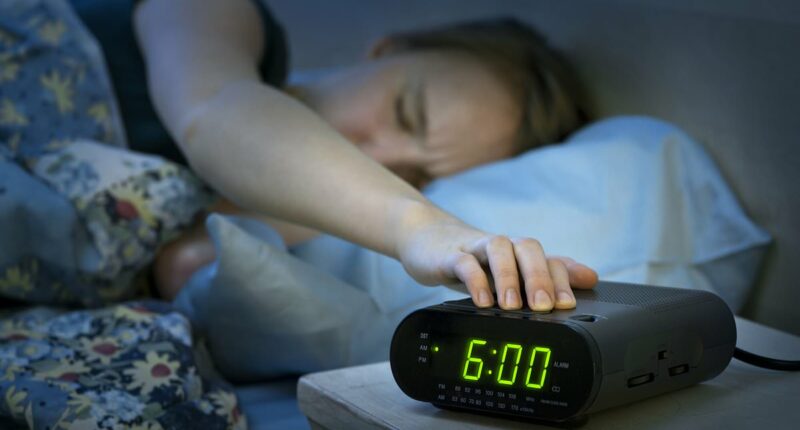Share this @internewscast.com
For many people, wildly flailing their arms to silence the incessant beeping of an alarm is as integral to the morning routine as brewing a cup of coffee.
However, a nurse has issued a warning that the habit of repeatedly pressing snooze can negatively impact your health, leading to a day filled with grogginess and exhaustion.
Posting on TikTok, US-based registered nurse Jordan Bruss told her 5,700 followers that it’s a common habit that needs to be stopped.
She said: ‘If you’re somebody who sets multiple alarms, I have bad news for you.
‘Waking to multiple alarms every morning really disrupts your REM cycle frequently.
‘This behavior contributes to sleep inertia, increasing drowsiness, fatigue, mood fluctuations, and elevating cortisol levels each time your alarm rings,’ she explained.
She noted that this practice places significant stress on your body at the start of the day, as the cortisol surge activates your fight or flight response.
‘Experiencing this repeatedly each morning is quite stressful; thus, when the alarm sounds, it’s better to rise rather than subject yourself to repeated stress,’ she advised.

‘So when the alarm goes off, it’s time, get up,’ said Ms Bruss (file photo).
‘Don’t cause yourself extra physical and mental stress.’
One way to make it easier to get up in the morning is to make sure your bedroom is set up for better starts to the day.
Recommendations from Bed Sava suggest leaving your curtains or blinds partially open at night for a natural wake-up cue with sunrise and to maintain consistent sleep and wake times daily.
In her video, Ms Bruss also referenced the link between stress and obesity.
‘Excess cortisol levels make you gain and hang on to weight,’ she said. ‘So when the alarm goes off, it’s time, get up. You’ll look and feel better.’
Cortisol is the primary stress hormone produced in your body; it keeps you alert and increases sugars in your bloodstream.
However, elevated cortisol levels lead to an increase in insulin, the fat-storing hormone.
Cortisol is sometimes known as the stress hormone, but it plays a much more complex role in the body.

People who set multiple alarms to help them get out of bed are also potentially making themselves ill.
There are receptors for the hormone on almost every part of your body, according to the Cleveland Clinic.
When it gets released into your blood stream, it can latch onto and affect everything from your immune system to your muscles to your hair, skin and nails.
Cortisol helps control how your body uses its energy, regulates blood pressure and tells you when to be alert and when to be asleep.
It also can play a role in inflammation, which has been linked to the rise in heart attacks and strokes in ‘healthy’ younger people.
Millions of Britons are living with conditions linked to inflammation.
While obesity is the main cause of this and other chronic health problems—typically type 2 diabetes and heart disease, which also damage the body’s maintenance systems, including immunity.
Other conditions where inflammation is implicated include non-alcoholic fatty liver disease, where stored fat clogs up the liver (this affects an estimated one adult in three) and dementia, which is often a complication of heart disease and diabetes.
A major research review, published in 2016 by the American Society for Nutrition, concluded that obesity and the health problems associated with it—such as high blood pressure, raised blood sugar levels and tummy fat—have a ‘substantial impact’ on the health of the immune system and defence against disease.
















